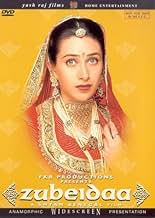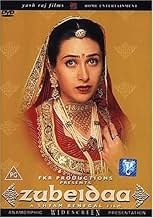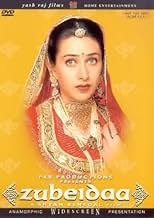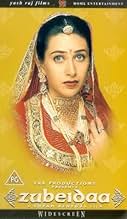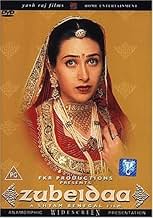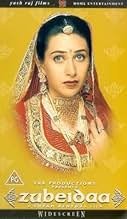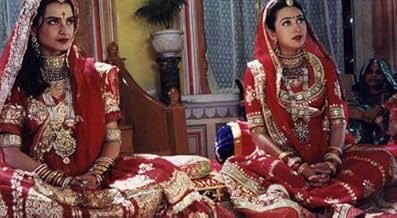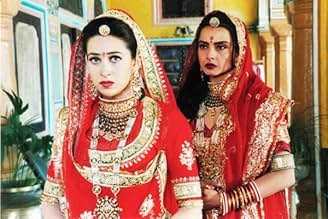VALUTAZIONE IMDb
6,6/10
1793
LA TUA VALUTAZIONE
Aggiungi una trama nella tua linguaZubeidaa, an aspiring Muslim actress, marries a Sikh prince to become his second wife. Her tumultuous relationship with her husband, and her inner demons lead her to a decision which has fat... Leggi tuttoZubeidaa, an aspiring Muslim actress, marries a Sikh prince to become his second wife. Her tumultuous relationship with her husband, and her inner demons lead her to a decision which has fatal consequences for them all.Zubeidaa, an aspiring Muslim actress, marries a Sikh prince to become his second wife. Her tumultuous relationship with her husband, and her inner demons lead her to a decision which has fatal consequences for them all.
- Premi
- 3 vittorie e 15 candidature totali
Manoj Bajpayee
- Raja Vijendra Singh
- (as Manoj Bajpai)
Rajit Kapoor
- Riyaz Masud
- (as Rajit Kapur)
Recensioni in evidenza
Shyam Benegal continues to carve out a niche as one of the leaders & promoters of indian parallel cinema. this film is based on a true story, set in last days of British rule in India. the acting is good all around, although no fireworks here. Karisma is as good here as she was in FIZA. it is a fairly straight forward biography, and although it was nicely done, i found it rather luke-warm as compared to Benegal's other films. in any case, it is a much needed break for viewers who are tired of watching typical Indian masala potboilers.
Riveting performances. Strong female characters. Patriarchy and the position of women.
Zubeida, is a classic film. In fact one of the best films to come out of the Hindi Film industry in recent times. All the aspects of the film, whether be it the taut and intelligent Direction (vintage Benegal ji), the music (the re-incarnation of R.D.Burman as modern age A.R. Rehman giving very popular and ever lasting amazing numbers, the haunting lyrics, the very original storyline, the entire canvass, was a cinematic treat. Of course the histrionic talents of Surekha Sikri, Amrish Puri, MAnoj Bajpai, Rajat Kapoor, Lillette Dubey amongst others combined with the deadly combination duo of my all time favourite actresses REkha and KArisma KApoor was deadly! In fact i can't thank Mr. Benegal enough for bringing these two great actresses in the same canvas and the result was there for everyone to see. KArisma, i would say, excelled is a low word, she just was as good as Smita Patil or Shabana Azmi would have been in the same role. The kind of Depth, the look, the innocence, the beauty, the charisma, the fear, the strength, the naivety, the revolt, the love - all these expressions and more that she displayed in this film were worth a NAtional Award at least if not the Oscar! Well, the Filmfare critics award made up for it. All in all a collector's item, a great always-to-be-remembered film.
In 2000, Khalid Mohammed, a famous film critic, directed a movie called Fiza. Fiza is one of my favourite films, and I particularly loved the great performance of its leading lady, Karisma Kapoor. In this film, Khalid Mohammed assumes a part as a writer. The one who directs this movie is none other than Shyam Benegal, one of India's all-time best filmmakers, and the one who plays the title role is Karisma Kapoor. This is the third movie in the unofficial trilogy of Benegal movies scripted by Mohammed, all of which are partly fictionalised true stories centred around Indian Muslim women who made a lasting impact on Mohammed's life. The first movie in the trilogy is the brilliant Mammo, which was based on Mohammed's beloved grandaunt, and the second is Sardari Begum, titled after a popular Thumari singer of his mother's era. Both characters actually appear in this movie. But here Mohammed tells the story of Zubeidaa Begum, who was his real mother.
Zubeidaa Begum was the daughter of a famous filmmaker and an aspiring actress. When her father, who disapproved of her dreams to pursue an acting career, found out she was acting secretly in films, he arranged her marriage to Mehboob Alam. However, right after Zubeidaa gave birth to a baby boy, they divorced. Zubeidaa was a charming, high-spirited, incredibly honest and rebellious woman who refused to live her life according to traditional mores and was constantly in search of happiness. One such opportunity presents itself in the form of Maharaja Vijayendra Singh, the prince of Fatehpur, who is already married to a much older Mandira Devi. Vijayendra instantly falls for Zubeidaa, and she leaves everything behind her, including her little son whom her father does not allow to take, to enter his house as his second wife. The story relates Zubeidaa's trials and tribulations in the big house, her loneliness and yearning for her son and for her husband, who has very little time for her.
The story of Zubeidaa is convincingly narrated and is efficiently presented through flashbacks as told to the character of Riyaz, Zubeidaa's elder son who is now a journalist trying to find some documentation of who his mother was. He is surprised to hear that she was a charismatic woman who lived life to the fullest, and the movie is authentic enough to make the viewer feel a connection to the story and to its main protagonist. Unsurprisingly, Shyam Benegal's direction is excellent and he unusually accepts many of the ingredients of mainstream Hindi cinema, which certainly sets this movie apart from his previous directorial efforts. He is aided by Mohammed's script, Javed Siddiqui's fantastic dialogues, the terrific sound design, the wonderful cinematography, and of course the art direction; the sets, the costumes and the props all successfully capture the atmosphere of the 1950s. One cannot go without mentioning A.R Rahman's music which gives life to the film. "So Gaye Hain" is the finest song in the soundtrack and its melody is really calm, haunting and melancholic.
The one who is most responsible for making Zubeidaa the movie that it is and the character so memorable is unquestionably Karisma Kapoor. After delivering an all-time great performance as the main protagonist in Khalid Mohammed's Fiza, she is now cast in the role of his mother to deliver another performance of equally high standards. Shyam Benegal once frankly stated that he actually had not seen a single movie of hers before, and therefore he directed her with utmost guidance. Kapoor's portrayal is indeed heartfelt, real and powerful, and she displays Zubeidaa's feisty nature, determination, yearning, anger and frustration with energy, depth and conviction that make her really easy to relate to. Manoj Bajpai is very fine as Zubeidaa's loving husband. Rekha is superb as Mandira. She is amazingly restrained and graceful and is mysterious enough to make one wonder what her real take was. The supporting cast includes Amrish Puri, Surekha Sikri, Rajit Kapoor and Lillete Dubey, and all of them manage to leave a mark.
Zubeidaa's ending is really poignant, but its melancholic and bittersweet feel actually explains why Zubeidaa Begum will be remembered. It's great that Mohammed decided to immortalise his mother even though he sadly did not even know her that much in her life and her portrait existed in his mind only from stories he had heard from those who knew her. Anyway, kudos to Mohammed, Benegal and Karisma Kapoor for making Zubeidaa the entertaining and moving picture that it is.
Zubeidaa Begum was the daughter of a famous filmmaker and an aspiring actress. When her father, who disapproved of her dreams to pursue an acting career, found out she was acting secretly in films, he arranged her marriage to Mehboob Alam. However, right after Zubeidaa gave birth to a baby boy, they divorced. Zubeidaa was a charming, high-spirited, incredibly honest and rebellious woman who refused to live her life according to traditional mores and was constantly in search of happiness. One such opportunity presents itself in the form of Maharaja Vijayendra Singh, the prince of Fatehpur, who is already married to a much older Mandira Devi. Vijayendra instantly falls for Zubeidaa, and she leaves everything behind her, including her little son whom her father does not allow to take, to enter his house as his second wife. The story relates Zubeidaa's trials and tribulations in the big house, her loneliness and yearning for her son and for her husband, who has very little time for her.
The story of Zubeidaa is convincingly narrated and is efficiently presented through flashbacks as told to the character of Riyaz, Zubeidaa's elder son who is now a journalist trying to find some documentation of who his mother was. He is surprised to hear that she was a charismatic woman who lived life to the fullest, and the movie is authentic enough to make the viewer feel a connection to the story and to its main protagonist. Unsurprisingly, Shyam Benegal's direction is excellent and he unusually accepts many of the ingredients of mainstream Hindi cinema, which certainly sets this movie apart from his previous directorial efforts. He is aided by Mohammed's script, Javed Siddiqui's fantastic dialogues, the terrific sound design, the wonderful cinematography, and of course the art direction; the sets, the costumes and the props all successfully capture the atmosphere of the 1950s. One cannot go without mentioning A.R Rahman's music which gives life to the film. "So Gaye Hain" is the finest song in the soundtrack and its melody is really calm, haunting and melancholic.
The one who is most responsible for making Zubeidaa the movie that it is and the character so memorable is unquestionably Karisma Kapoor. After delivering an all-time great performance as the main protagonist in Khalid Mohammed's Fiza, she is now cast in the role of his mother to deliver another performance of equally high standards. Shyam Benegal once frankly stated that he actually had not seen a single movie of hers before, and therefore he directed her with utmost guidance. Kapoor's portrayal is indeed heartfelt, real and powerful, and she displays Zubeidaa's feisty nature, determination, yearning, anger and frustration with energy, depth and conviction that make her really easy to relate to. Manoj Bajpai is very fine as Zubeidaa's loving husband. Rekha is superb as Mandira. She is amazingly restrained and graceful and is mysterious enough to make one wonder what her real take was. The supporting cast includes Amrish Puri, Surekha Sikri, Rajit Kapoor and Lillete Dubey, and all of them manage to leave a mark.
Zubeidaa's ending is really poignant, but its melancholic and bittersweet feel actually explains why Zubeidaa Begum will be remembered. It's great that Mohammed decided to immortalise his mother even though he sadly did not even know her that much in her life and her portrait existed in his mind only from stories he had heard from those who knew her. Anyway, kudos to Mohammed, Benegal and Karisma Kapoor for making Zubeidaa the entertaining and moving picture that it is.
A vision of female follies & desires SHYAM Benegal spearheaded the parallel cinema movement in the 70s and the 80s with movies like Nishant and Manthan whereby making icons of Shabana Azmi, Naseeruddin Shah and Smita Patil. His genuine concern with womens' issues is evident in movies like Mammo and Sardari Begum (both scripted by Khalid Mohammad) with their women-oriented themes. His latest film Zubeidaa offers perspective vignettes and explores the female psyche and interaction in different environments. Benegal has a kindly vision of female follies and characters, their motivations, desperation's and desires.
Starring Karisma Kapur, Rekha and Manoj Bajpai, the film has strong a backup in Surekha Sikri and Lillette Dubey, supported by his favorites Amrish Puri and Rajit Kapur, Shyam Benegal calls his film a "lyrical romance" and it is one, but that is not all that his film offers. The film, a period romance set in the 1950s, is the story of a young Muslim girl from an affluent family. When her father discovers that his daughter has signed a film, he forces her into a marriage which ends in a divorce and a baby. Zubeidaa meets her true love, a Rajasthani prince (Manoj Bajpai) but the trouble is that he is already married. However, she consents to becoming his Chhoti Rani.
Basically there are four strongly etched characters in the film. Surekha Sikri is the Muslim wife in an urban, educated setting who abides by the laws set down by the husband and accepts his tyranny as a traditional male domain, "you know sahib always has his way. You'll have to do what he says in the end". Her contemporary is Lillette Dubey who plays Miss Rose Davenport, a dancer in the movies and she's utterly irrepressible! Out to have a good time, she interacts on a superficial level with everyone connected to her. Still she has a kind heart and when she decides that Zubeidaa has had enough of moping around after her divorce, she promptly introduces her to the dashing prince and shamelessly abets the romance. Her statement, "men and horses are more my style my dear", (said with a mischievous wink) is completely her! The interesting thing is that the same fact, when examined by her and by Sikri, portrays diametrically different views of the truth making one realize that truth is never absolute! These two utterly different women, belonging to the same generation, remain true to type till their old age.
Karisma Kapoor and Rekha in Zubeidaa Benegal is never judgmental and nor does he allow the audience to become holier-than-thou. So human are both the women and so sympathetically has the director dealt with his characters that one simply accepts them and likes them.
The main character, that of Zubeidaa, superbly portrayed by Karisma Kapur, has overlapping shades to it. Zubeidaa has fiery feminist instincts and is rebellious and tempestuous until the end. At the same time she's feminine, vulnerable and very young. She chooses to live her life the way she wants to. After giving into paternal authority once in her first marriage, she isn't willing to throw away her chance for happiness the second time. Fully aware of the prince's previous marriage and family, she's ready to accept a strange environment and a different religion for the sake of love. She makes her choices and sacrifices willingly and knowingly. Karisma has surpassed herself as the passionate, defiant, willful and troubled Zubeidaa, the truly modern woman.
In direct contrast to her is Mandira Devi, the Patrani of the prince. Graceful, mature and traditional, she upholds the role and duties of the Rajasthani princess, yet surprises Zubeidaa by saying, "call me Mandy". She treats Zubeidaa with resigned, amused affection, never losing her savor-fare while she instructs Zubeidaa in her expected role.
The most important facet that Benegal has been able to bring out through the film is the fact of female bonding. Whether it is Lillette with Karisma or Karisma with Surekha or Karisma with Rekha, females in the film interact, react, exist and equate with each other, despite the parameters set by males. They understand and accept each others' drives and emotions. Rekha and Karisma, in fact, have a frank discussion about their respective relationships with the prince. Both accept that they have a different role to play in his lifebut in the final analysis, that role is assigned by the male. So if the prince says of his senior wife, "woh eek ache Rajput bah ha", he says to Karisma, "sada ha seen bane Rana Ur Dill belling", leaving no ambiguity in the respective role expectation.
The plot of the story moves fast from scene to scenefrom the 50s to the 80s (the film is in a series of flash-backs) without losing track of the story. It is also not so 'period' that one cannot relate to it. There are traces of the British upper class manners,egg. The meals and decor in Karisma's house is very Anglicized, people speak English comfortably, on the stereo a Dean Martin song is playing, in a party is a live band with the saxophone, trumpet and drums playing a waltz. There are puff sleeves, shingled hair and net depots, there is talk of the newly-formed Pakistan, the Privy-purses being withdrawn is a burning issue and many details like these to make the setting completely authentic. Back home in Fatehpur too, the true Rajasthani setting has been portrayed with attention to minute detail.
In the final analysis, Benegal has made a film which is a milestone as far as women-oriented movies are concerned. The theme, characterization and issues that the film examines are fair to women and have been examined without any searing criticism to mar the tone of the picture.
Starring Karisma Kapur, Rekha and Manoj Bajpai, the film has strong a backup in Surekha Sikri and Lillette Dubey, supported by his favorites Amrish Puri and Rajit Kapur, Shyam Benegal calls his film a "lyrical romance" and it is one, but that is not all that his film offers. The film, a period romance set in the 1950s, is the story of a young Muslim girl from an affluent family. When her father discovers that his daughter has signed a film, he forces her into a marriage which ends in a divorce and a baby. Zubeidaa meets her true love, a Rajasthani prince (Manoj Bajpai) but the trouble is that he is already married. However, she consents to becoming his Chhoti Rani.
Basically there are four strongly etched characters in the film. Surekha Sikri is the Muslim wife in an urban, educated setting who abides by the laws set down by the husband and accepts his tyranny as a traditional male domain, "you know sahib always has his way. You'll have to do what he says in the end". Her contemporary is Lillette Dubey who plays Miss Rose Davenport, a dancer in the movies and she's utterly irrepressible! Out to have a good time, she interacts on a superficial level with everyone connected to her. Still she has a kind heart and when she decides that Zubeidaa has had enough of moping around after her divorce, she promptly introduces her to the dashing prince and shamelessly abets the romance. Her statement, "men and horses are more my style my dear", (said with a mischievous wink) is completely her! The interesting thing is that the same fact, when examined by her and by Sikri, portrays diametrically different views of the truth making one realize that truth is never absolute! These two utterly different women, belonging to the same generation, remain true to type till their old age.
Karisma Kapoor and Rekha in Zubeidaa Benegal is never judgmental and nor does he allow the audience to become holier-than-thou. So human are both the women and so sympathetically has the director dealt with his characters that one simply accepts them and likes them.
The main character, that of Zubeidaa, superbly portrayed by Karisma Kapur, has overlapping shades to it. Zubeidaa has fiery feminist instincts and is rebellious and tempestuous until the end. At the same time she's feminine, vulnerable and very young. She chooses to live her life the way she wants to. After giving into paternal authority once in her first marriage, she isn't willing to throw away her chance for happiness the second time. Fully aware of the prince's previous marriage and family, she's ready to accept a strange environment and a different religion for the sake of love. She makes her choices and sacrifices willingly and knowingly. Karisma has surpassed herself as the passionate, defiant, willful and troubled Zubeidaa, the truly modern woman.
In direct contrast to her is Mandira Devi, the Patrani of the prince. Graceful, mature and traditional, she upholds the role and duties of the Rajasthani princess, yet surprises Zubeidaa by saying, "call me Mandy". She treats Zubeidaa with resigned, amused affection, never losing her savor-fare while she instructs Zubeidaa in her expected role.
The most important facet that Benegal has been able to bring out through the film is the fact of female bonding. Whether it is Lillette with Karisma or Karisma with Surekha or Karisma with Rekha, females in the film interact, react, exist and equate with each other, despite the parameters set by males. They understand and accept each others' drives and emotions. Rekha and Karisma, in fact, have a frank discussion about their respective relationships with the prince. Both accept that they have a different role to play in his lifebut in the final analysis, that role is assigned by the male. So if the prince says of his senior wife, "woh eek ache Rajput bah ha", he says to Karisma, "sada ha seen bane Rana Ur Dill belling", leaving no ambiguity in the respective role expectation.
The plot of the story moves fast from scene to scenefrom the 50s to the 80s (the film is in a series of flash-backs) without losing track of the story. It is also not so 'period' that one cannot relate to it. There are traces of the British upper class manners,egg. The meals and decor in Karisma's house is very Anglicized, people speak English comfortably, on the stereo a Dean Martin song is playing, in a party is a live band with the saxophone, trumpet and drums playing a waltz. There are puff sleeves, shingled hair and net depots, there is talk of the newly-formed Pakistan, the Privy-purses being withdrawn is a burning issue and many details like these to make the setting completely authentic. Back home in Fatehpur too, the true Rajasthani setting has been portrayed with attention to minute detail.
In the final analysis, Benegal has made a film which is a milestone as far as women-oriented movies are concerned. The theme, characterization and issues that the film examines are fair to women and have been examined without any searing criticism to mar the tone of the picture.
Lo sapevi?
- QuizThe jewelry worn by Karisma Kapoor and Rekha in the film actually belonged to the Jaipur royal family. Both actresses were told to be very careful when wearing it.
- BlooperThe events of the movie are happening in the 1950s, around the time of decolonization, yet the prince Victor appears to be flying a 1982 model of Cessna 172.
- ConnessioniFeatured in Bollywood/Hollywood (2002)
I più visti
Accedi per valutare e creare un elenco di titoli salvati per ottenere consigli personalizzati
- How long is Zubeidaa?Powered by Alexa
Dettagli
- Tempo di esecuzione2 ore 33 minuti
- Colore
- Mix di suoni
- Proporzioni
- 2.35 : 1
Contribuisci a questa pagina
Suggerisci una modifica o aggiungi i contenuti mancanti


